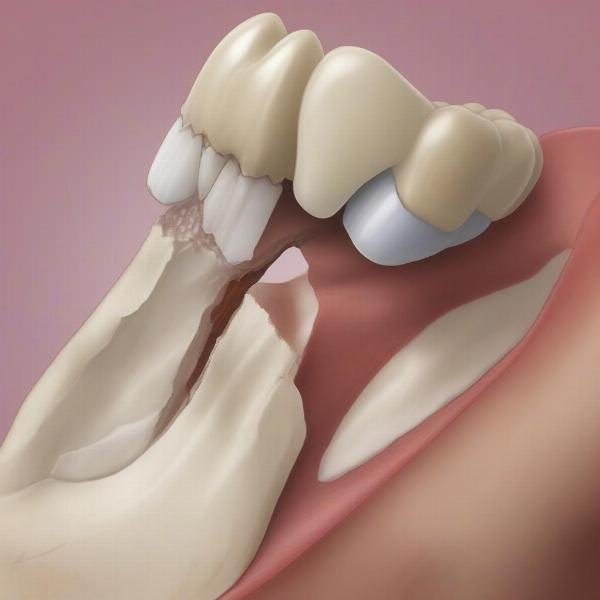Dog jaw bones, often marketed as natural and long-lasting chews, are a popular choice for pet owners. However, it’s crucial to understand the potential risks and benefits associated with these chews to ensure your dog’s safety and well-being. This guide will delve into the pros and cons of dog jaw bones, explore safer alternatives, and equip you with the knowledge to make informed decisions about your dog’s chewing habits.
Understanding the Appeal of Jaw Bones
Many dog owners are drawn to jaw bones due to their perceived natural origin and durability. They often believe that these bones mimic what dogs would chew on in the wild, providing a satisfying and instinctive chewing experience. Additionally, the hardness of jaw bones can be appealing for dogs who are aggressive chewers.
Potential Risks of Dog Jaw Bone Chews
While seemingly natural, dog jaw bones pose several significant risks. The hardness of these bones can lead to fractured teeth, which can be painful and require expensive veterinary care. Splintering is another serious concern. Sharp bone fragments can cause injuries to the mouth, throat, stomach, and intestines. In some cases, these splinters can even lead to intestinal blockage, requiring emergency surgery.
 Răng chó gãy do nhai
Răng chó gãy do nhai
Safer Chewing Alternatives for Your Dog
Fortunately, there are numerous safer alternatives to dog jaw bones that can satisfy your dog’s chewing instincts without compromising their health. antler dog chews are a popular option, known for their durability and natural composition. Dog toys chewing made from durable, non-toxic materials like rubber or nylon can also provide a safe and enjoyable chewing experience. For dogs who enjoy a softer chew, consider tall tails leather dog toys. Always supervise your dog while they are chewing on any toy or treat.
Choosing the Right Chew for Your Dog
When selecting a chew for your dog, consider their size, age, and chewing habits. Bully sticks for big dogs are a good option, but always ensure they are appropriately sized to prevent choking hazards. If you’re unsure whether a particular chew is suitable for your dog, consult with your veterinarian. They can offer personalized recommendations based on your dog’s individual needs. Avoid giving your dog cooked bones of any kind, as these are even more prone to splintering than raw bones. Also, be cautious with is beef hide ok for dogs as they can pose digestive issues for some dogs.
Conclusion: Prioritizing Your Dog’s Safety
While dog jaw bones may seem like a natural choice, the potential risks they pose to your dog’s dental and digestive health are significant. By opting for safer alternatives and understanding your dog’s individual chewing needs, you can provide them with a fulfilling chewing experience while safeguarding their well-being.
- Are dog jaw bones safe for puppies? No, puppies have developing teeth and are particularly vulnerable to the risks associated with jaw bones.
- What should I do if my dog swallows a bone splinter? Contact your veterinarian immediately.
- Are there any benefits to giving my dog a jaw bone? While some argue that jaw bones can help clean teeth, the risks often outweigh any potential benefits.
- How can I tell if my dog’s tooth is fractured? Signs of a fractured tooth include pain, reluctance to eat, and bleeding from the mouth.
- What are some other natural chew options besides antlers? Consider bully sticks, sweet potato chews, or dried fish skins.
- How often should I replace my dog’s chew toys? Replace chews when they become worn or small enough to be a choking hazard.
- Can I give my dog cooked bones instead of raw bones? No, cooked bones are more brittle and prone to splintering, making them even more dangerous than raw bones.
ILM Dog is your trusted international resource for all things dog care and well-being. We offer expert advice on breed selection, health and medical care, training and behavior, nutrition, grooming, exercise, puppy care, senior dog care, dog travel, and product recommendations. From understanding the intricacies of dog jaw bones to choosing the perfect chew toy, ILM Dog is committed to providing you with the information you need to be the best pet parent possible. For further assistance or personalized advice, please reach out to our expert team via email at [email protected] or call us at +44 20-3965-8624. Visit us online at ILM Dog for a wealth of resources to support you and your furry companion.